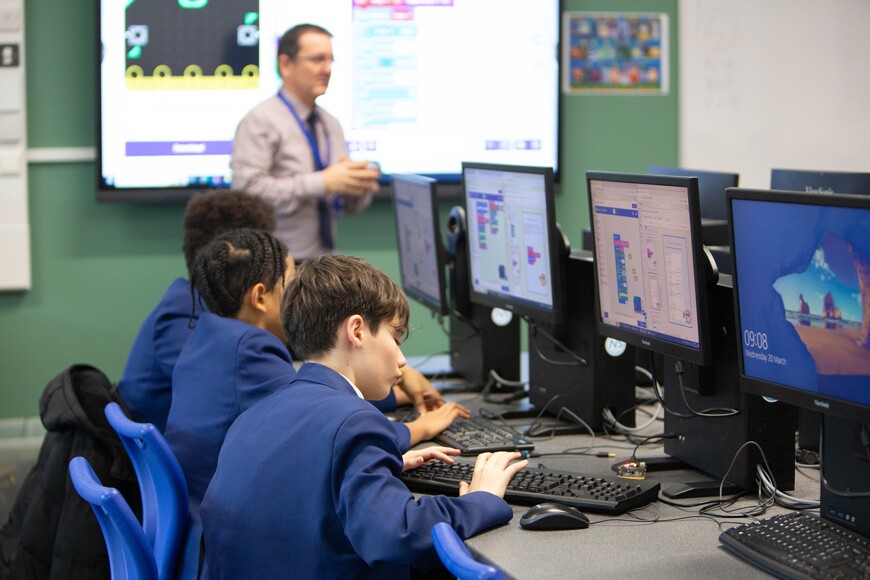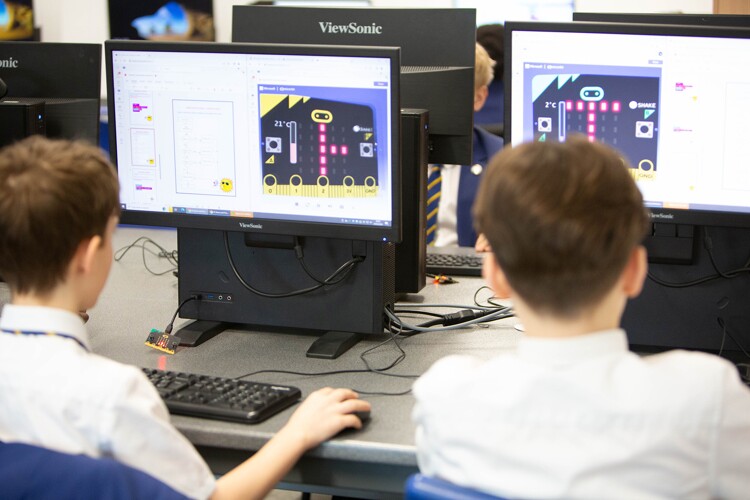Computer Science

Curriculum Statement: Computer Science
Curriculum aims:
We want to set up students for the future and this future will undoubtedly be affected by changes in technology. Computer Science affects the way we communicate, travel, learn, interact and more. It has positive and negative influences on society but the impact it has is only going to increase and students that are prepared for this and able to build the technology of tomorrow will be the “rock stars” of today. Students should learn to love the challenge of thinking in a different way (computationally), solving complex problems and consistently pushing themselves out of their comfort zone. Whether or not students choose to pursue a career in Computer Science or not, they should have the knowledge to be able to communicate technically in future careers with those in Computer Science-based roles. In the future students should also be confident with the digital literacy skills required to be able to effectively and safely use a computer, and the software on it, to support their own learning and their future job roles. For those students that want to study the subject further we hope to inspire them to build on what we have taught them to pursue their own passions and develop their skills further by independent learning.
Our curriculum aims to enable students to meet the key areas of the National Curriculum and develop their computational thinking, logical reasoning and ability to decompose complex problems and solve them independently. In Computing students will learn above and beyond the National Curriculum expectations by being able to apply their knowledge to real world situations by using physical computing and taking part in inspirational trips. Students should understand the positive and negative impact computers have on society and be able to consider the future impact of technology and the ethical considerations that accompany this.
The curriculum aims to develop a sound understanding of the key features of Computing including networking and how to code. We hope to inspire students to want to study the subject further and enable them to make an informed decision of areas of the subject to pursue.
Curriculum Features:

At all levels students will be provided with practical opportunities to develop their computational thinking and problem solving skills. The classroom environment will help to enable students to try and fail in their programming challenges, challenge themselves and be inspired when their program works. We hope to inspire students when learning to code so that they want to learn how to make other types of software. Students will learn the key skill of thinking computationally at the start of the course. This will include how to design and code algorithms using key programming techniques. This will then support their learning throughout the course to help embed the theoretical content then taught. Students will finally learn complex algorithms that will develop their computational thinking fully. Students will use their practical skills to learn theoretical concepts where possible to help engage and enthuse students in their own learning.
Co Curricular experiences:
- Use digital literacy techniques taught in Computing lessons, across all subjects e.g. accessing e mail, saving to cloud, how to organise files etc.
- Key Stage 3 Game Academy – A weekly coding club aimed at learning skills to make computer games
- Year 8 Cyberfirst Girls Competition – Develops computational thinking and problem solving skills
- Year 9/10 Robot Rumble – allows students to design and build a robot and code the robot to complete a series of tasks. Builds on physical computing.
- Year 10 trip to Bletchley to look at code breaking and the history of computers. – students learn how computers have developed over time.
- Year 12 trip to EGX to look at code advances in Computer games.
- BEBRAS – used across all year group to give students experience in solving a range of Computational thinking problems.
What follows is a current summary of the intended subject curriculum content in each year of the key stage. It highlights the key knowledge and skills intended for learning, and some of the ways progress in the curriculum is to be assessed. It clarifies the key questions students should be addressing and gives links to help students and families to develop this learning further.
KS3
This current academic year we teach Year 7 for 1 period per week. This is the first year that Year 7 have been taught computer science. Therefore, there is some duplication of units across year 7 and 8. Next year we have updated plans to reflect that fact that year 7 have been taught this year.
KS3 Computing information 23-24
KS4
GCSE Computer Science Curriculum Map Yr 10 V1
GCSE Computer Science Curriculum Map Yr 10 V2



